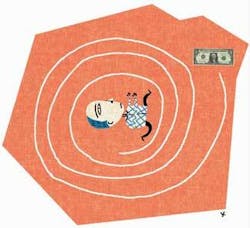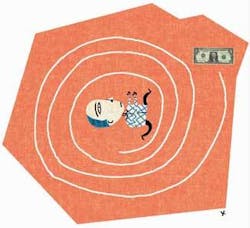The Multimillion Dollar Mindset
How to get from here to there from someone who’s been there.
by Joseph Iannello, DDS
So maybe you’ve been dreaming of owning a multimillion dollar dental practice. Your mind swims with visions of tons of patients, and multiple hygienists and assistants tending to them. You imagine having general and specialist associates doing procedures you now refer out, treatment you feel is either beyond your expertise or you just don’t want to do anymore. So I’ll ask you directly - do you really want a practice that generates that kind of revenue, that in effect means you no longer own a dental practice, but a dental business?
Well then, if you truly do, keep on reading. In case you’re wondering, yes, I have “walked the walk and talked the talk.” I developed de novo a dental practice/business that produces over $5 million a year. Yes, that was my goal, my dream, and my vision. But I’m even prouder to say that I recently sold this business to several of my associates who have been with me for years.
If your dream is a seven-plus-figure per year business, you have to start somewhere, and the starting point is your mindset. Everything else flows from that. It’s all about the derivatives of mindset, specifically attitude and vision.
Let’s start with attitude. The first question to ask yourself is, Who am I? Are you an entrepreneur, or are you a dreamer? You must be absolutely honest with yourself beginning with this simple, but very important, question. Do production targets, collection goals, new-patient counts, and size of your practice (a) scare you, (b) bore you, or (c) excite you?
If you answered (a) - that these concepts scare you - decide if you are scared because of lack of knowledge, lack of confidence, or lack of work ethic. If it is lack of knowledge, you can be helped. If it is lack of confidence, you can be helped. If it is lack of work ethic, you must be willing to help yourself before you will respond to someone trying to help you.
If you answered (b) - that the concepts above bore you - decide if you are bored because of the same old hassles with insurance companies, whining patients, and unappreciative, selfish employees. I will let you in on a little secret. It is actually easier - yes, I said easier - to manage a big practice with multiple employees than a small practice consisting of one dentist (you), one assistant, one hygienist, and one receptionist. It is also much more rewarding financially. For starters, in the small practice, pretty much every dollar must be produced by you!
Lose the one assistant or receptionist or hygienist and you have lost 100 percent of that department’s contribution to your success. In a large practice, you have multiple staff members, so losing any one individual is only a small percentage of contribution. Furthermore, rather than burdening your receptionist with all of the appointment calls, new-patient questions, insurance matters, collection issues, etc., these tasks can be parceled out to individuals who “specialize” in them.
This creates a team approach of “specialists” who not only have a deeper understanding of matters like collection and insurance, but who are more committed to the practice and have time to give these important issues the attention they deserve. These individuals do not have to put the issues aside because they are dealing with the daily flow of patient visits and calls to the front desk.
Since we all like sports analogies, I’ll give you some. The incomparable Lance Armstrong might be viewed as an enormously successful “solo practitioner.” But he really isn’t. He is surrounded by fellow teammates and supporters before and during the Tour de France whose pacing times, mechanical expertise, and coaching all contribute immensely to his success. Armstrong is the “main man,” and the final success ultimately rests on his shoulders. If Armstrong doesn’t show up for the race due to disability, lack of work ethic, or boredom, there is no way his “team” can win.
To illustrate the big group practice, let’s use the most recent football dynasty, the New England Patriots. The Patriots have an outstanding coach in Bill Belichick and an accomplished quarterback in Tom Brady. These men get the majority of the news headlines, but they are only the best known of many stars on this winning team. And like any highly successful team, they have offensive and defensive players specializing in certain plays and positions, all ready on a moment’s notice. If Brady or Belichick are disabled or fatigued, there are other coaches and quarterbacks to back them up to give the team a very good chance that the successful record continues.
If you answered (c) to the question above - that these concepts excite you - that every time you read an article about a large grossing practice you feel a rush of adrenaline and your competitive juices flow, that doing excellent restorations is satisfying but not the be all and end all of what you want to accomplish, then you just might be a natural entrepreneur!
You should no longer see yourself as limited to “dentist.” You really are a businessman/woman who happens to be a dentist. You must envision yourself as a CEO of a significantly sized company, not “the dentist in the dental practice.” The fact is, your business can be a health-services company that provides dental services.
The true path to big numbers and big profits is this: more hands do more dentistry, which brings in more money and creates a more valuable business. God gave each of us only two hands. Since you really only make money when those two hands are treating a patient, more hands times more patients equals more revenue!
I have yet to come across a dentist who owned a practice as a hobby. You invest years and tens of thousands of dollars to educate yourself and earn the privilege to provide professional health services. It should go without saying that those services should be provided in an honest, ethical manner.
Since this article is not about clinical dentistry and there are many philosophies on how best to deliver care, let’s talk “dental economics” and focus on what being the owner of a business is really all about.
Your business is an asset that has to provide you an adequate ROI (return on investment). The name of the “business” game is to make money. That ROI is twofold: ➊ a continuous stream of income, and ➋ appreciation in the value of that business.
Understand that to build and grow your business to one million and then multimillions of dollars does not necessarily mean a boutique dental spa, nor does it mean accepting every insurance plan, capitation plan, and Medicaid plan out there. I was able to generate the numbers we consistently produced without capitation, without Medicaid, and without accepting every insurance plan. I never advertised, offered “free exam” coupons, had a “welcome wagon,” or did direct mail to new residents. I’m not saying any of these options are good or bad; I am simply saying that they are not necessary to develop a monster dental business.
That takes us to the other leg of mindset - vision. Here’s what I did: I started from scratch, worked very hard chairside for a number of years, and as the patient volume expanded, I gradually added more and more capable general dentists, hygienists, specialists, and financial administrators to my team. And I do really and truly mean team.
Through the years I gradually reduced my clinical hours and for the last seven years did not do any clinical dentistry. I went from primary provider, to part-time provider, to full-time coach. Part of the proper mindset means that to get what you want, you have to give other people what they want first. Put aside your ego that you are the “star,” that only you can masterfully provide the finest in dental care to patients, that the business is all about you, that you pay yourself first and everyone else waits.
Instead put patients first, staff second, and yourself last ... and patients and staff will reward you more than you expect. Patients will refer not just to you, but to your company. With your support and encouragement, other doctors in your business will shine. The same approach works wonders with hygienists.
Let your doctors do what doctors are trained to do - full treatment plans, offering any and all treatment they feel comfortable and experienced enough to provide. Do not be the “diva” by thinking you are the only one with the ability to diagnose and develop treatment plans. Don’t skim off the more lucrative cases and transfer over the “menial” treatment. Doing so may give you some temporary personal production, but in the end will alienate your doctors so they will not be committed to you and your company.
Treat your associates as if they were your partners. Be sure you compensate all doctors and hygienists on a percentage basis, specifically a percent of what they produce. Note I said produce, not collect. Your providers produce; your receptionists and administrative staff collect. You as the CEO must oversee both. It is not fair to hold providers responsible for treatment they properly diagnosed and rendered if the staff members who are dedicated to collections are not doing their job. They will all amaze you by producing more. The result is more for them, more for you, and more for your business.Dr. Joseph Iannello is president of Bayview Group, a management consulting and financial firm for million-dollar-plus practices. Reach him via e-mail at [email protected].

